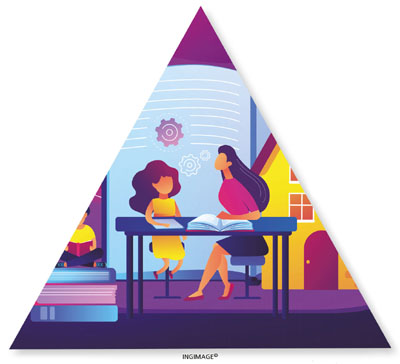EDUCATING SRI LANKA
CURFEW CHEER
Parents and children have had an opportunity to strengthen family ties – Goolbai Gunasekara
 Every parent anticipates and often dreads the holidays when children are underfoot most of the day. When kids reach their teens, they tend to occupy themselves with their computers, smartphones, friends and outdoor activities.
Every parent anticipates and often dreads the holidays when children are underfoot most of the day. When kids reach their teens, they tend to occupy themselves with their computers, smartphones, friends and outdoor activities.
But children under 10 are not a free-ranging group. They need constant supervision and overseeing as to how they’re spending their time. Children require a lot of attention so that their inventive little minds are directed along useful channels.
Mothers are quite used to their children saying ‘I have nothing to do, Ammi’; ‘Can I go and play next door?’; ‘Please play ludo with me’; or even the more hopeful request – ‘Take me out for a hotdog!’
Usually, mothers shut their ears to this verbal stream and have stock answers: ‘This is a good time to arrange all your toys before lunch and all your schoolbooks after lunch’; ‘Finish your homework and show me’; or ‘Practise your violin before your teacher refuses to continue your lessons.’
All this had juniors hopping smartly out of their mother’s way and managing to cope with any boredom they might have been feeling. Parents were the last people to whom one went for entertainment.
But the extended curfew ushered in a totally new form of behaviour. Whether they liked it or not, parents and children were forced to be together for weeks at a stretch; and unless the family was living in a mansion, they must surely have stumbled over each other all the time.
Whether families are functional or dysfunctional, united or splintered, normal or abnormal, usual or unusual, they were all forced to coexist.
Adjustment and cooperation are needed at this time of lockdown. Principals of schools have been trying for decades to get their students and parents onto a more mutually understanding footing. And now, voila, it couldn’t have been choreographed better.
As a former school principal, I’d like to think that wiser parents are using this enforced togetherness to grow closer to their children. I hope that somehow, this time is being utilised to bridge that yawning gap, which I used to see developing between modern parents and their schooling children.
I can only speak of children who attended international and private schools since they are the only ones I know. There’s a certain degree of affluence in these homes and so the social lives of parents often took precedence over time with their children.
Fathers were busy in offices and often travelled overseas. Mothers did their best; but chauffeuring kids, running a home, managing domestics, supervising homework, and carrying out the many other tasks that were needed generally took up their attention and time.
If the mother was a career woman, another strain was placed on her daily routine. In the hurly burly of modern life, family togetherness was not a priority.
But today, as I pen this article, I know that many fathers are actually talking to their offspring –and both sides are finding it quite engrossing.
One father decided to teach his seven-year-old to play chess and discovered to his pleasant surprise that the boy was a natural. He immediately arranged for his son to be tutored in chess when the curfew was lifted.
Another father discussed the Bible with his 13-year-old twins. One gentleman helped his wife in the kitchen and the whole family experimented with strange dishes since half the necessary ingredients couldn’t be bought. It was a time for laughter during a dark period.
Of course, daily life hasn’t been easy. Procuring supplies has been a problem but we must acknowledge that the government has done all it can so far. Families are being brought together in this time of crisis – and I can’t overestimate the importance of togetherness in family relationships.
No one expects family life to be all sweetness and light during the lockdown. Fathers, mothers and children are going to get on each other’s nerves; but somehow – after the turmoil is over for the day – families are actually talking to each other. Daily encounters with their parents have done more good than one can imagine for children.
The benefits of enforced intimacy have had results that weren’t foreseen. And the whole family has to face the daily traumas together. Fathers who expected their needs to come first are suddenly relegated to being last since the children need to be cared for first.
Having to feed everybody in the family prevents favouritism. Food that everyone disliked is being eaten without a murmur and the family is told to be thankful for whatever is available.
This time of crisis has been a great leveller. What was important yesterday is suddenly of no value today. It’s difficult to think of anything good emerging from this pandemic but renewed personal ties are surely something to be thankful for.



